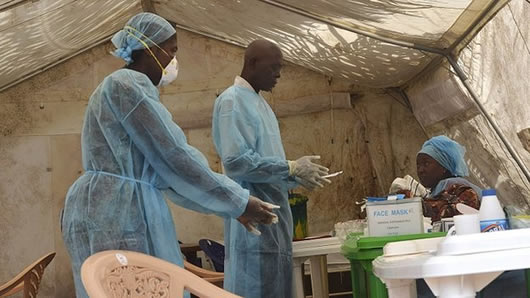 The United Nations today sent out an urgent international rescue call for $600 million supplies to West Africa to stem the exponential rise in the Ebola epidemic.
The United Nations today sent out an urgent international rescue call for $600 million supplies to West Africa to stem the exponential rise in the Ebola epidemic.
According to World Health Organization, Ebola has so far killed 1,590 people and infected at least 3,500 people in, Guinea, Liberia, Sierra Leone and Nigeria since the outbreak began this year.
The next few weeks will be crucial, UN Secretary General Ban Ki-Moon warned, stressing that ‘The people of Guinea, Liberia and Sierra Leone in particular are looking to us for support. They are counting on us for a massive surge in assistance: more doctors, nurses and beds; more equipment, trucks and other vehicles”.
Secretary General Ban Ki-Moon at a meeting with senior leaders and experts from across the United Nations system at the United Nations headquarters in New York said the plan “is to stop Ebola transmission in affected countries within six to nine months and to prevent the international spread of the virus”.
“The disease is spreading far faster than the response. People are increasingly frustrated that it is not being controlled” he stated at the meeting which was joined through video-teleconference by World Bank President Jim Yong Kim and many heads of Agencies and Funds and Programmes, such as UNDP, UNICEF, OCHA, UNFPA, ICAO and many other agency heads.
The Secretary General expressed fears that what “began as a public health emergency is evolving into a social and economic challenge for millions”, pointing out that “the world can no longer afford to short-change global public health. This can be done only if the urgent and necessary mobilization is done both in the affected countries and by the international community”.
Calling for better awareness and understanding about what the world was facing, he urged airlines and shipping companies not to cancel flights and docking to the affected countries. “Banning flights and shipping services will not keep Ebola from spreading, but it will keep medical teams from reaching people most in need. Stigma and rumour can do just as much damage as the virus itself”, he said.
At the meeting which agreed to establish an Ebola crisis centre to bring synergy and efficiency to the efforts of the many partners within and beyond the United Nations, the Secretary General of the 194-member world body harped on the fact that “Ebola can be avoided and controlled. The virus has been contained elsewhere in the past, and we can do it today as well. We know what to do and what needs to be done”.
In this connection, he tasked the international community to contribute to the WHO Roadmap by providing — people, material and funding, saying that his meetings and telephone conversations with world leaders continue to call for contributions and support.
“We have seen the courageous responses of health personnel. We are determined to show our solidarity with them and scale up our efforts to tackle the epidemic. This is a huge, serious challenge. We are organizing to meet it. I am convinced we can succeed”, the UN concluded.
Source: ISD (R. Harry Reynolds, NY)























